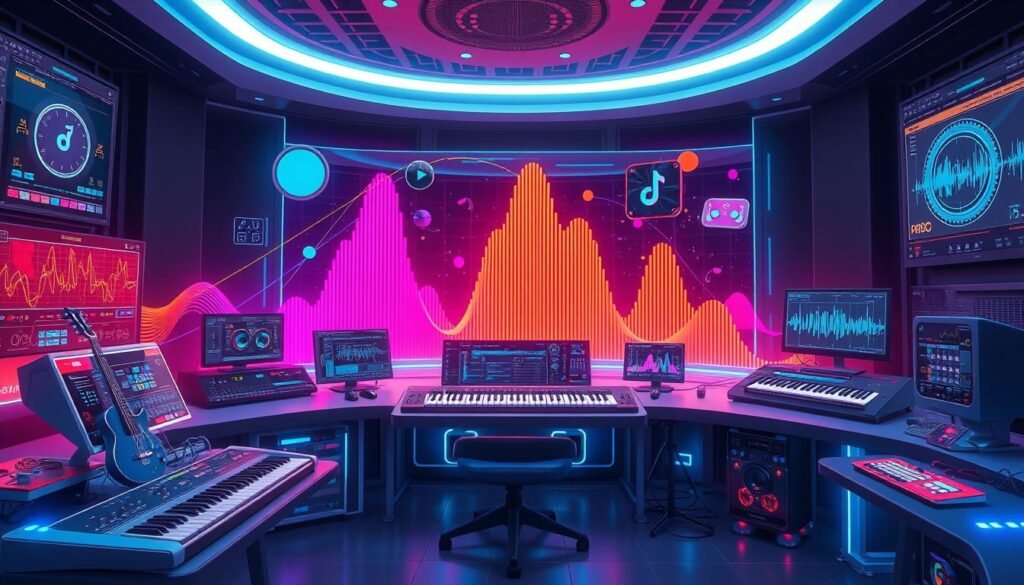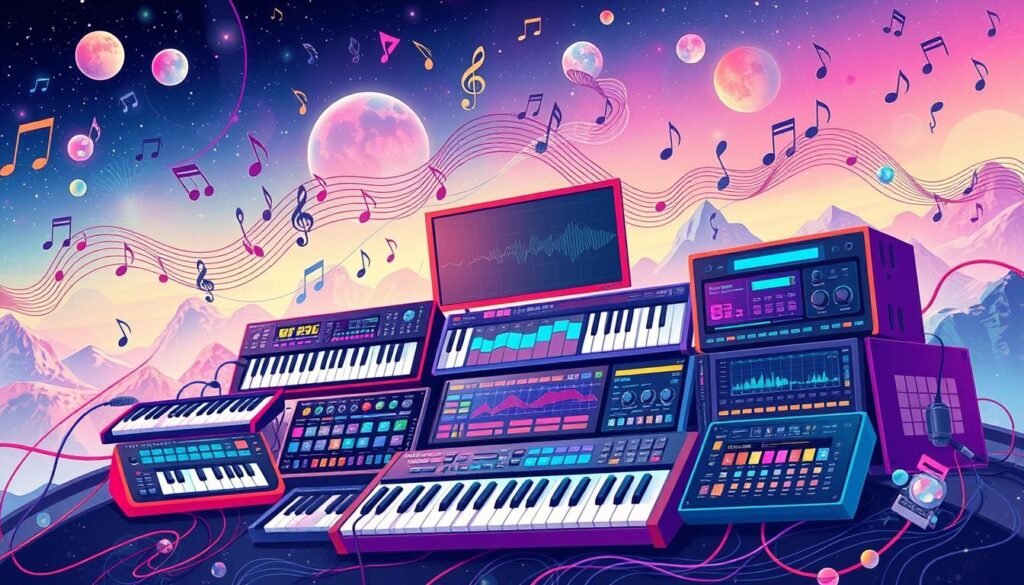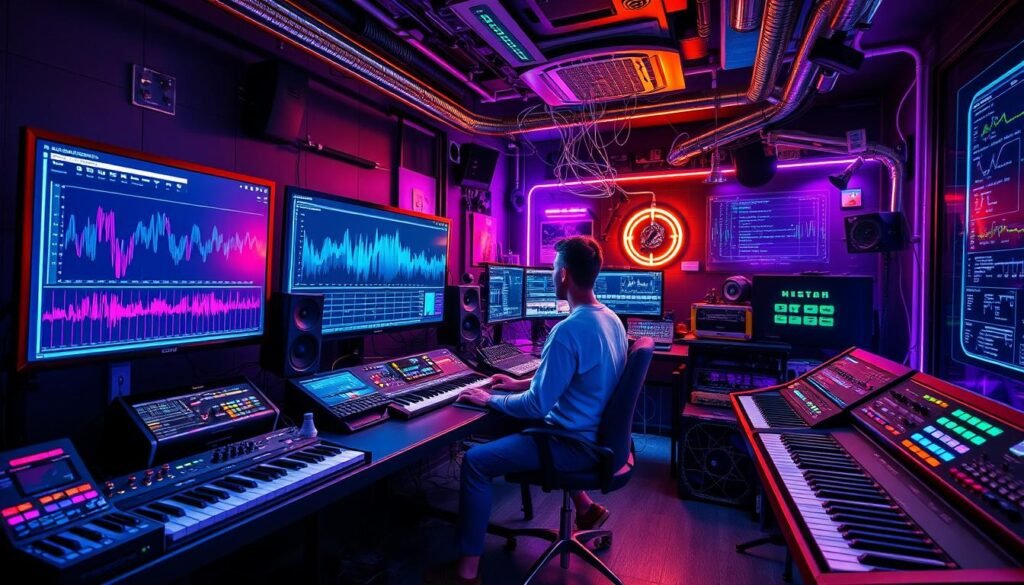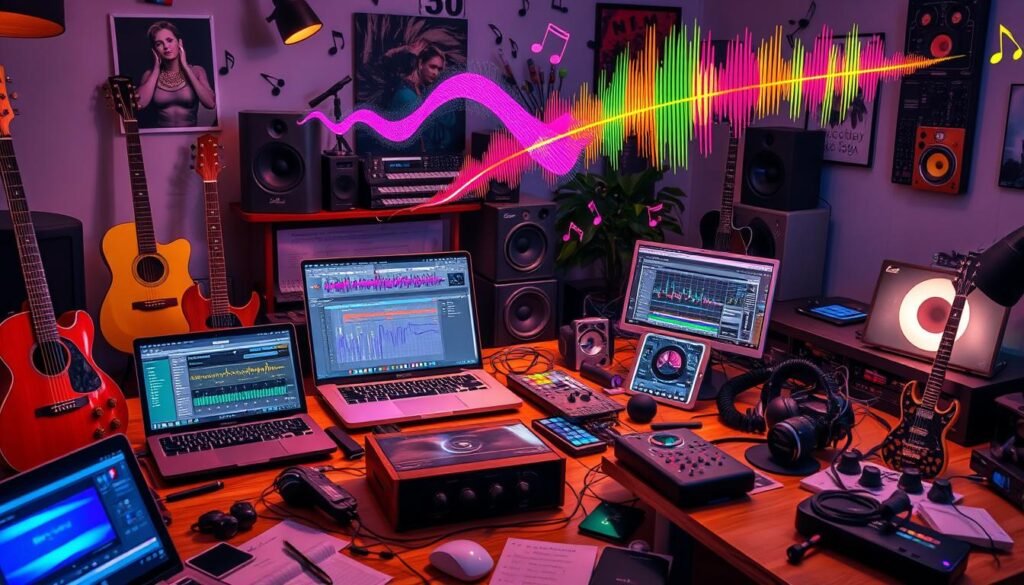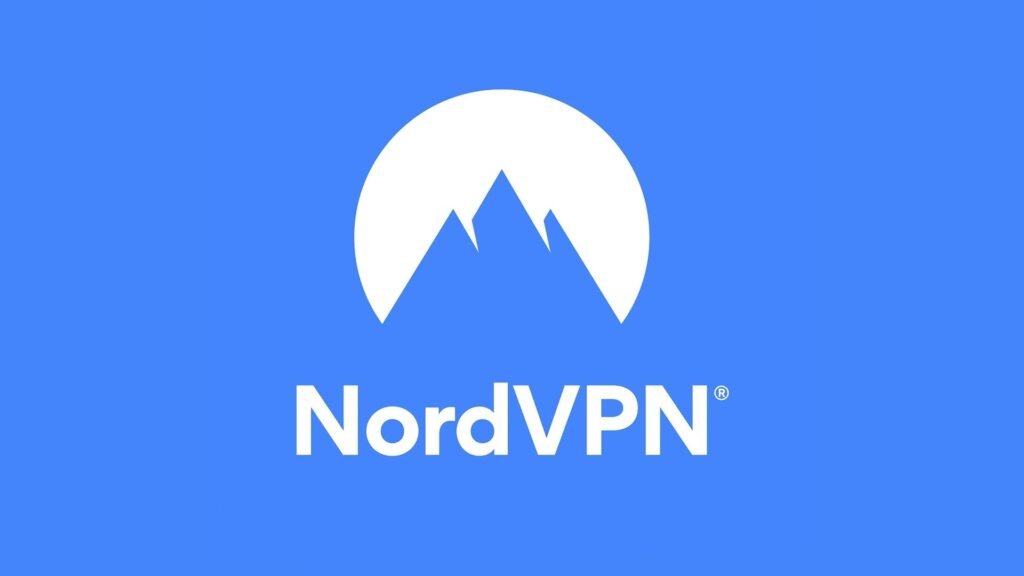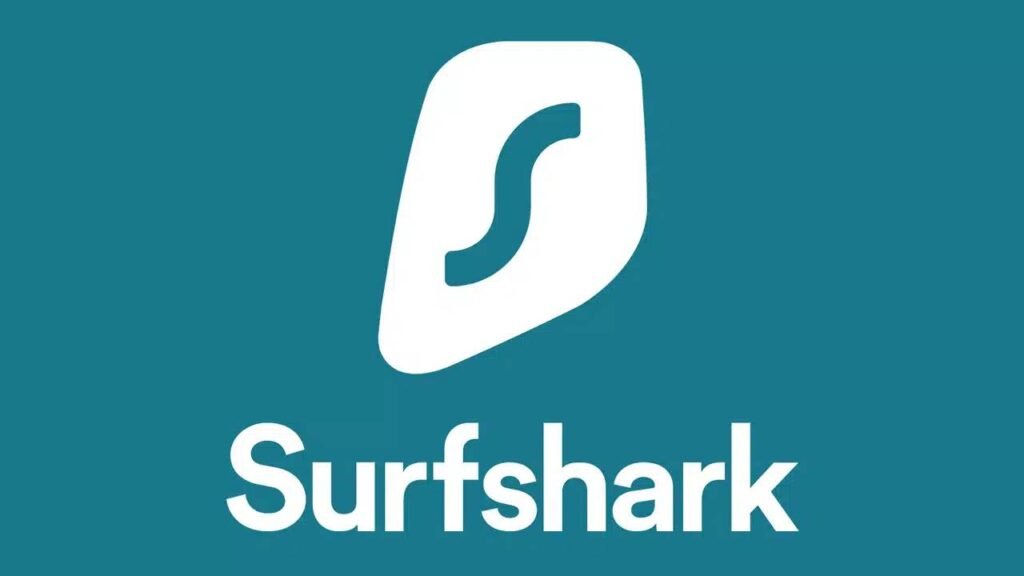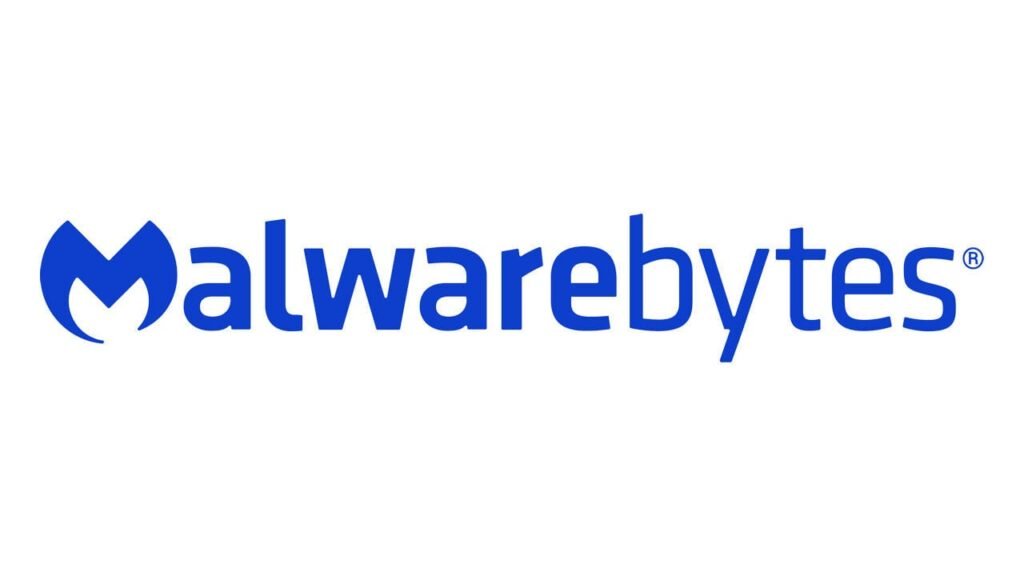Did you know the global AI in music market is set to explode? It's going from USD 3.9 billion in 2023 to about USD 38.7 billion by 2033. This huge jump, with a growth rate of 25.8% each year, shows how AI is changing music creation and listening1. AI music tools are making music production easier and more open to everyone, from pros to beginners.
These tools let you create original music easily, even if you're not an expert. You can make melodies, write songs, or even full tracks with AI music generation. It offers many music generation tools to fit your needs.
As AI becomes more common in music, it's changing how we create and think about music. These tools not only make music making easier but also raise interesting questions about copyright and what makes music real. Let's dive into the world of AI-generated music and see how it can change your creative projects.
Key Takeaways
- The AI music market is projected to grow from USD 3.9 billion in 2023 to USD 38.7 billion by 2033.
- AI-generated music tools cater to both seasoned musicians and novices.
- These tools provide innovative ways to create, produce, and enjoy music.
- Advanced music technology simplifies the creative process, making it widely accessible.
- AI tools are transforming the industry with new capabilities while posing challenges regarding authenticity.
The Rise of AI-Generated Music
AI is changing music production, giving artists new tools to create. It boosts creativity and makes work easier. AI can write music, from melodies to lyrics, that sounds like it was made by humans2. Also, services like Spotify use AI to suggest music based on what you like2.
Impact of AI on Music Production
More musicians are using AI tools, up 45% in just a year3. LANDR uses AI to master music, making it sound better2. Yousician helps musicians get better by analyzing their playing and giving feedback2.
Market Growth and Projections
The market for AI in music is growing fast. It's expected to keep growing as more people use AI tools. Already, over 88% of artists use AI to help them create3. This shows AI is becoming more popular, with a 40% rise in AI use among new musicians3.
The global AI in music market could hit USD 38.7 billion by 2033. This is a 25.8% CAGR for the next decade2.
Understanding AI Music Generation Technologies
AI music generation has changed how we make music. In the late 1990s and early 2000s, computers started to compose music on their own. They got better over time4. Now, AI can make music that's rich and varied, changing how we create.
How AI Algorithms Create Music
AI uses machine learning and neural networks to study lots of music. OpenAI's Jukebox and Magenta show how these tools can be used. They let developers and musicians try new things5. For example, AIVA is seen as a real composer in France, showing AI's role in music4.
Differences Between AI Composition and Traditional Methods
Traditional music comes from human feelings and experience. AI music is based on data analysis. This leads to new sounds and genres that humans might not think of.
AI makes music fast and cheap, helping artists bring their ideas to life5. Musicians can also learn to use AI tools. They might even create their own AI software, growing their creative skills4.
Benefits of Using AI Music Tools
AI music tools offer many advantages that can greatly enhance your music-making experience. These tools are changing how artists create and produce music. They make the process more efficient and accessible.
Cost Reduction in Music Production
One key benefit of AI music tools is the big cost savings in music production. AI platforms let musicians make top-notch tracks without spending a lot on studios or session musicians. This is a big win for indie musicians, as it makes their projects more affordable6.
Speeding Up the Creative Process
AI tools speed up the creative process by quickly coming up with new ideas. For example, Amper Music and AIVA can create songs based on what you input. This lets artists quickly turn ideas into full songs, giving them more time for tweaking and improving7.
Accessibility for Non-Musicians
AI music tools make music creation open to everyone, not just trained musicians. Easy-to-use platforms let non-musicians create high-quality music. This means more people can join in and add to the music world, bringing more variety to music6.
AI-Generated Music: Tools to Enhance Creative Projects
Today, we see a wide range of AI music tools that can boost creative work. Each tool has its own special features and how easy it is to use. It's important for creators to pick the right tool for their needs.
Overview of Various Music Generation Tools
Suno AI offers a Pro Subscription for $8 a month and a Premier Subscription for $248. Udio AI has plans from $0 to $30, meeting different song generation needs8. Soundraw AI has a Free Plan, a Creator Plan at $16.99, and an Artist Plan at $29.99 for unlimited songs8.
Beatoven.ai uses a freemium model, with prices based on how long you generate music8.
Comparison of Features and Usability
LALAL.AI is great for separating stems, which is good for remixing and sampling9. Ozone 11 is fast at mastering, saving time9. Magenta Studio has a simple interface for making experimental music9.
AIVA creates unique songs based on what you like9. BandLab SongStarter gives musical ideas based on your mood, helping with creative blocks9. A detailed comparison helps find the best tool for your project.
It's key to know how easy these tools are to use. Landr offers quick, professional mastering. Moises App accurately separates vocals and instruments9. Atlas by Algonaut helps with drum kit creation9. Choosing tools based on these factors makes your creative work smoother.
For more on how these platforms handle your data, see the privacy policy of Software and Learning.
Top AI Music Generators for 2024
In 2024, the world of AI music generators is changing fast. There are many tools for different needs. You might choose based on what others say or the latest trends.
Recommendations Based on User Needs
AIVA is great for making orchestral music. It has improved since 2016 and lets users create music without worrying about licenses10. Mubert is perfect for those who like music to be made right before their ears. Soundraw is known for its customizable music, ideal for creators who want to use their music forever11.
There are many other AI music generators out there:
- Suno AI – Offers a free plan with 50 credits daily and paid options from $8 per month for more credits12.
- SongR – Still in Beta, it's free with no limits, great for trying out new ideas12.
- Soundraw.io – Free to use but downloads are limited, paid plans start at $16.99 monthly12.
- Splash Pro – Allows unlimited song creation up to 60 seconds for free; paid plans start at $8 for longer songs12.
- Riffusion – Lets users input lyrics for AI to create music, a unique feature12.
Prevailing Trends in AI Music Tools
AI music tools are getting better at being easy to use and working well with other software. BandLab's SongStarter gives users musical ideas to spark creativity11. Beatoven.ai makes creating drum patterns easier with its automations and customization11.
Google's Music Language Model (Music LM) is a big step forward. It uses natural language processing to create music-related content11. As these trends grow, AI music generators will keep finding new ways to make music more personal for everyone.
| AI Music Generator | Key Features | Pricing |
|---|---|---|
| AIVA | Orchestral compositions with licensing freedom | Varies based on usage |
| Mubert | Real-time music generation | Subscription-based |
| Soundraw.io | Customizable tracks with lifetime usage rights | Free plan; paid from $16.99/month |
| Suno AI | Free plan with daily credits | Free (50 credits); Paid from $8/month |
| SongR | Completely free with no restrictions | Free |
| Splash Pro | Unlimited song creation up to 60 seconds | Starting at $8/month |
| Riffusion | Lyric-based vocal and music generation | Free with limitations |
How to Choose the Right AI Music Generator
Choosing the right AI music generator is key to your creative success. Look for tools with easy-to-use interfaces, customizable settings, and top-notch audio quality. Make sure the tool fits your artistic vision and meets your specific needs.
Key Features to Look For
When picking an AI music generator, consider these features to consider:
- User Interface: Choose tools with simple navigation to make your creative process smoother.
- Customization: Options to tweak tempo, instruments, and vocal styles let you create music that's uniquely yours.
- Audio Quality: Ensure the tool produces audio that's professional-grade for your projects.
- Library of Sounds: A wide range of sound samples and effects can boost your music.
- Collaborative Tools: Tools that support teamwork can make your projects more dynamic.
The AI music industry is expected to grow by 27.2% annually until 2030. This shows how crucial it is to pick the right tool13.
Understanding Pricing Models
It's important to understand pricing models when making your choice. Different platforms offer various subscription plans to meet different user needs:
| AI Music Tool | Pricing | Plan Features |
|---|---|---|
| Aiva Technologies | Free plan + Paid options | Basic features for free, more with paid plans. |
| Beatoven.ai | Starting at $6/month | Offers various creative tools with subscription plans. |
| Soundful | Free plan + Upgrade options | Free basic features, premium upgrades available. |
| Suno | Free plan + Additional options | Accessible to both casual and professional users. |
| Udio | Free plan + Paid tiers | Includes features like emotional vocal integration and stem separation. |
| Brain.fm | $9.99/month or $69.99/year | Focuses on music for mental states and productivity. |
70% of musicians using AI tools see their creativity and productivity soar. This shows the value of investing in these platforms13. With options ranging from free to comprehensive packages, finding a generator that fits your budget is easy14.
The Future of AI in Music Production
The world of music production is changing fast. AI in music is bringing new possibilities and things to think about. We expect more music that fits our tastes and AI in live shows. These changes will open up new ways to make music.
Tools like Amper Music's Songwriter and AIVA are helping musicians. They create new melodies and lyrics. This is changing the music industry in exciting ways15.
Predictions for Creative Innovation
Experts say the AI music market will grow a lot. It could be worth $1.10 billion by 2027, growing fast16. This shows more people are using AI in music.
Google and Meta have shown cool tools like MusicLM and MusicGen. They make music from text. This is making music more creative16. Big companies might use AI for half of the music market by 203016.
Potential Challenges and Opportunities
But, there are also big challenges. Questions about who owns AI music are big worries for artists15. There are also worries about AI changing the value of human music.
With careful handling, AI can make music better. It can help artists be more creative while keeping their special touch.
Case Studies of AI Music Tool Usage
AI music tools are changing the creative world. They are especially useful for content creators. Here are some examples of how these tools help with projects and follow commercial trends.
Real-World Applications for Content Creators
One interesting example is when OpenAI's ChatGPT and Suno made a custom birthday song for an author's autistic niece. This song was made over 10,000 kilometers away. Suno created an R&B song in just a few tries, touching the family deeply.
Fiona's mom cried, and Fiona was overjoyed. People thought a professional singer had been hired17. This shows AI tools save time and improve creativity, offering unique and precise results.
Emerging Trends in Commercial Use
The use of AI in music is growing fast. Techniques like continuation and harmonization are leading the way. OpenAI's MuseNet lets users compose in different styles, while Boomy makes songwriting easy for non-musicians18.
The AI music market is expected to grow by 41.89% annually. It could reach $1.10 billion by 202716. This shows a big move towards using technology in music, changing the industry's future.
| AI Tool | Primary Function | Target User |
|---|---|---|
| OpenAI's MuseNet | Generates compositions across various genres | Musicians and composers |
| Suno | Creates songs based on input | Content creators |
| Boomy | User-friendly music creation platform | Anyone, especially non-musicians |
| Aiva | Editing generated music note-by-note | Musicians seeking control over compositions |
| Google Magenta | Timbral transfer and sound alteration | Artists and audio engineers |
Integration of AI Music Tools in Creative Projects
AI music tools are changing how artists work and perform. They let you team up with musicians in new ways. AI can offer melodies, harmonies, or full songs, opening up new creative paths.
Collaborating with Human Musicians
AI is a great partner when working with musicians. It can make music that fits your audience perfectly. AI tools like AIVA and MuseNet help create unique songs that match your vision1920.
Enhancing Live Performances with AI
AI can make live shows better. It can adjust sound levels and create tracks on the fly. This makes performances more lively and engaging1920.
| AI Tool | Key Features | Collaborative Benefits |
|---|---|---|
| AIVA | Generates original compositions | Enhances creative collaboration with musicians |
| MuseNet | Analyzes music to create new compositions | Inspires musical exploration and development |
| Magenta | Machine learning for music generation | Streamlines creative processes in performances |
Using AI music tools opens up endless possibilities for collaboration and live shows. It's a chance to take your art to new heights1920.
Conclusion
AI-generated music is changing the way we create, offering artists new sounds and ways to compose. It has been shown to increase productivity and creativity by 20% for those using it21. With the AI music market expected to grow by 35% by 2024, the future of music looks bright22.
AI is more than just a trend; it's a game-changer in music. Tools like Google’s Magenta, OpenAI Jukebox, and AIVA make music creation accessible to everyone23. As AI gets better, it will bring even more advanced music, opening doors to new artistic possibilities.

